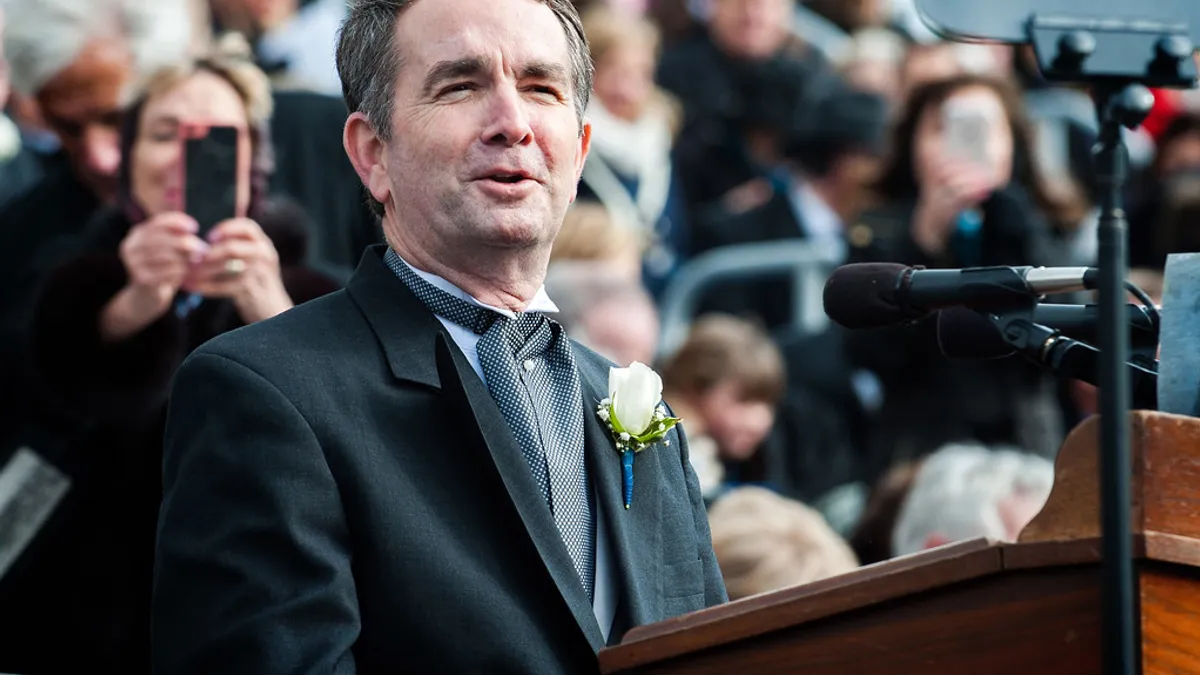Dive Brief:
- Virginia's governor on Thursday proposed a $145 million plan to pay for two years of free community college for low- and middle-income students pursuing in-demand jobs.
- The plan — called the Get Skilled, Get a Job, Give Back (G3) initiative — would target students going into several industries with large skills gaps, including health care, information technology and early childhood education.
- The G3 plan would cover tuition, fees and books for eligible students, as well as provide up to $1,000 during the fall and spring semesters and $500 in the summer term for full-time students who qualify for full federal Pell Grants.
Dive Insight:
With Gov. Ralph Northam's proposal, included in his draft budget, Virginia joins a growing number of states that have or are considering implementing some form of free college. However, Northam's proposal has a couple of unique features.
Most free college plans are considered "last-dollar" programs, meaning they only pay for tuition and fees after all other grants and scholarships have been applied.
Last-dollar programs are more likely to benefit middle- and high-income students instead of their low-income peers, who may already have all or most of their tuition costs covered by Pell Grants.
To support students who need additional financial assistance, some community colleges with free tuition plans have offered their own grant programs to help students pay for nontuition costs, such as child care, transportation and food. Although Northam's plan is also last-dollar, he bakes such support into the plan by paying for all eligible students' books and providing additional grants to support Pell students' nontuition costs.
Many programs also have eligibility restrictions, such as age cutoffs and full-time enrollment requirements, that college access experts say can limit their impact. In Northam's plan, there are no age restrictions and students can be part-time to receive general tuition support, though Pell students must be full-time to qualify for additional grants.
His plan also has a strong emphasis on closing skills gaps in high-demand industries.
"This is an investment in equity and our economy — by helping Virginians get the skills they need, we're building a world-class workforce while ensuring all Virginians can support themselves, their families, and their communities," Northam said in the plan's announcement.
Framing the plan as a way to supply local companies with skilled workers instead of an entitlement program could be critical to its passing the Virginia General Assembly with bipartisan support. The Democratic party just won control of both chambers in the state legislature.
In Tennessee, a reliably red state, lawmakers were able to gain support for free community college by promoting the program as a way to grow the economy, Politico reported. Since then, the state's graduation rates have risen, and it has expanded the program to adult students.
Yet promise programs often don't include additional funding for institutions' operations, which may experience enrollment growth they aren't prepared to handle or an influx of less academically prepared students who need support services.
Northam's proposal would give community colleges additional funding to support its career and counseling services for each participating student who either completes 30 credit hours or earns an associate degree.
Experts often advise states considering promise programs to include these financial supports.
"There is a ton of potential here," Christina Hubbard, senior director of community college strategic research for EAB, told Education Dive earlier this month. "My biggest concern is that promise programs have rolled out without putting all the pieces in place first."











